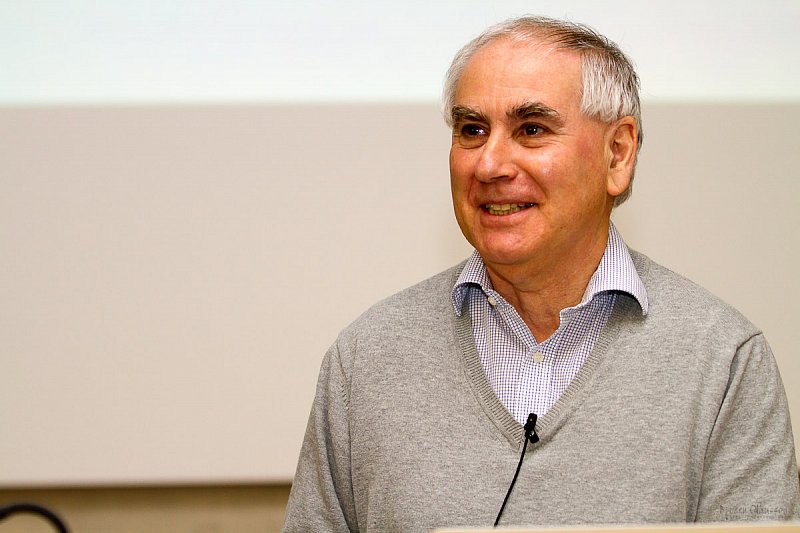Connell Lecture Series: Dr. Tom Rapoport

written by Alexa Fitzpatrick
photo courtesy of the Martin-Luther University of Halle-Wittenberg
Dr. Tom Rapoport is a professor with the Department of Cell Biology at Harvard Medical School, and a Howard Hughes Medical Institute Investigator. Dr. Rapoport will be discussing his research on the mechanisms of protein translocation as part of the George Connell Lecture Series at the University of Toronto on April 24, 2019. With excitement for this upcoming event, Dr. Rapoport shares his journey as a scientist and offers insight to young students building their careers.
Rapoport was born and raised in Ohio until the age of three, when his parents left for Austria, finally settling down in East-Germany in 1951. His parents, a biochemist and pediatrician, raised him in what he calls a “scientific household”. He fondly recalls memories of early experiments changing the color of pudding, which his mom made him record in a notebook. Rapoport credits his parents for his early interest in science and research, and has a great respect for students who might not experience the same support at home. “I have a huge admiration for students who have to set a new path for themselves. I have had those students working in my lab, it can be a difficult time for them, feeling misunderstood and having to be so independent.” Rapoport emphasizes the responsibility of our society to support these young students.
After completing his Ph.D from Humboldt University in 1972, Rapoport moved into the field of molecular biology and joined Sinaida Rosenthal in Berlin, who was eager to start molecular cloning in East-Germany. “If you’re going to start cloning, you should start with Insulin”, his mom said at the dinner table one night. That’s what they began to do. In East Germany nothing was easy, as they lacked resources and interactions with scientists abroad. They were behind in the field and had to do everything on their own.
If you are successful after many attempts, they will call you persistent. If you fail after many attempts, they will call you stubborn. And they really are the same thing
Rapoport reflects on what kept him motivated during this time, and how staying open to following his research led him to where he is today. “For me, it was not about the technique, it was always more important to answer a biological question.” He is referring to the fact that he noticed a difference in the behavior of the translation product of insulin mRNA and proinsulin. At the same time, signal sequences were discovered and he realized that his translation product still contained its signal peptide. This was the starting point for his interest in how signal sequences are recognized and how proteins cross membranes, ultimately leading to the identification of the translocation channel. “I was always willing to follow science wherever it took me, I still am always on the lookout for new projects and paths.”
Rapoport has achieved great successes in his career, notably determining the X-ray structure of the translocation channel alone and in action. These were very large goals that were seemingly impossible at the time. “I think big goals are important, you know those things you dream about. It is good for students to have two projects, one that is more ambitious and maybe a little unlikely [he laughs], and one that is more realistic. I can’t expect a student to stay forever to complete a larger, long-term goal so you have to break it down into smaller steps, and that can keep the motivation.”
Although he successfully accomplished these goals, there will always be questions that get left behind. “When do you walk away? That is the hardest thing there is. If you are successful after many attempts, they will call you persistent. If you fail after many attempts, they will call you stubborn. And they really are the same thing. That decision just has to come from your intuition, and with a little bit of luck.”
Rapoport has also been a very successful professor and mentor, and reflects on the transition from post-doctoral studies to his professorship. “Being a scientist in academia is the best job there is. I get the freedom to follow my curiosity, I have an international family and as I age, the students who join the lab remain young. But the transition to independence is hard, you don’t always have the training to prepare you for the additional responsibilities.” The transition often comes with stepping away from the bench if you want to balance different projects, and take an advisory role. “Believe it or not, I still do some benchwork. But I think with all the projects in the lab, I am much better for everyone as an advisor.” His success as a mentor clearly stems from his passion to see his students develop. “I really try to understand each student and find a project that works with their strengths and weaknesses. I think about that all the time.”
If you are interested in learning more about the Rapoport Lab, you can visit them at their website.
